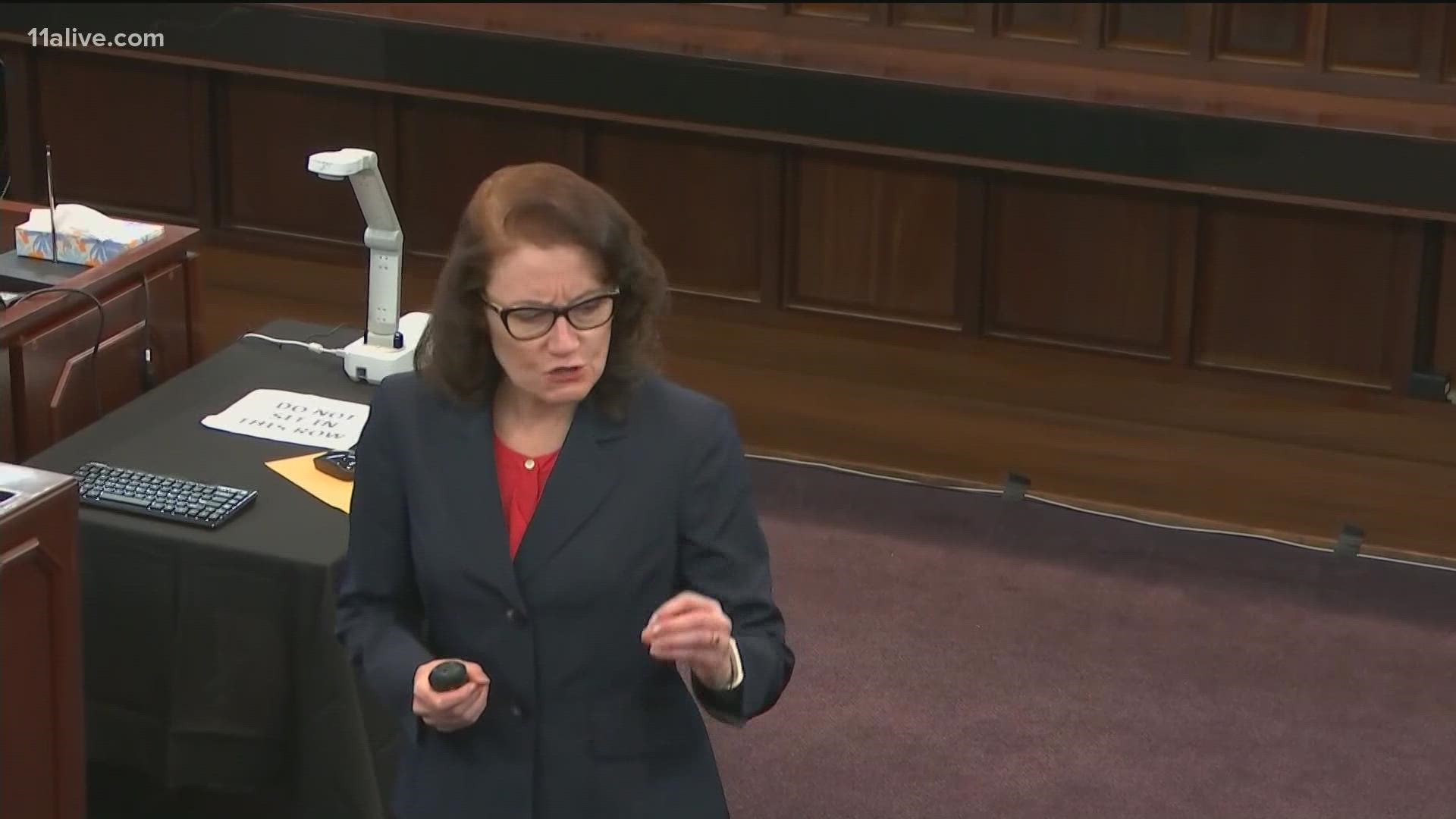GLYNN COUNTY, Ga. — Prosecutors opened one of the most socially and politically consequential trials in Georgia's recent memory on Friday in Glynn County by making the argument that a combination of intent and bias in the actions that led to the killing of Ahmaud Arbery constituted murder.
"Assumptions and driveway decisions," are at the heart of the case, prosecutor Linda Dunikoski argued.
Father and son Gregory and Travis McMichael and a third man, William "Roddie" Bryan face murder charges in the Feb. 23, 2020 killing, which would go on to be one of the galvanizing cases for racial justice protests that swept the country last year.
In a roughly hour-and-a-half opening statement, Dunikoski framed the actions of the three defendants as a coordinated and intentional "attack" on Arbery, grounded in unwarranted suspicions about him, that led to his death.
"In this case, all three of these defendants did everything they did based on assumptions," Dunikoski said. "Not on facts, not on evidence - on assumptions. And they made decisions in their driveways based on those assumptions that took a young man's life, and that is why we are here."
She sought to establish the course of events of the day of Arbery's death and in the months leading into it.
The prosecutor presented the evidence as a straight-forward line from common entrances onto a property under construction in the Satilla Shores neighborhood, and the suspicions of residents in the neighborhood about thefts associated with the people going onto the property, to the decision of the McMichaels and Bryan to pursue Arbery and how they went about their pursuit.
Dunikoski said cameras on the property showed Arbery had wandered onto the property - an unfinished home, without doors or fencing to keep people out - and done nothing several times before Feb. 23, 2020. She said the owner of the property had told police he didn't suspect Arbery had ever taken anything - rather, he suspected a white couple that had been seen on-site with a bag - and that police had informed the McMichaels that Arbery was not suspected
Nonetheless, Dunikoski argued, on the day he was killed, Gregory McMichael initiated the pursuit when he saw Arbery running past his own home a few doors down from the unfinished house, he "assumed the worst."
The prosecutor recalled Gregory McMichael's statement to a 911 dispatch, when asked why he was calling: "There's a Black male running down the street."
"That's the 'emergency,'" Dunikoski said.
She indicated she planned to use the particulars of the pursuit - Bryan's alleged attempts to hit Arbery with his truck and pin him in the neighborhood, Travis McMichael's positioning and pointing of his shotgun, Greg McMichael's alleged threat of "stop or I'll blow your f****** head off" - to establish why their pursuit was in fact an "attack" on Arbery.
"How do you know this was an attack?" she asked. "Because Greg said it perfectly: Mr. Arbery was 'trapped like a rat.' Trapped like a rat."
And, she argued, none of them had direct evidence Arbery had done anything - Gregory McMichael was in his driveway when he saw him run by, Travis McMichael was in their house when his father came to get him, and Bryan followed them when he saw them chasing Arbery.
They made, in her words, "driveway decisions," with "no immediate knowledge of anything or any crime that Mr. Arbery committed."
Despite the defense that they were attempting a citizen's arrest (under a now-repealed slavery-era Georgia law), she said, "No one said I was trying to arrest him for crime of fill-in-the-blank. Not one defendant ever said, 'I was trying to arrest him.'"
Arbery, she said, was found after his death to have "nothing on him - no backpack, no bag, no cell phone, no ID, no wallet, no keys, no gun, no weapon."
"Mr. Arbery couldn’t have even called for help if he wanted to, because he had no cell phone," she said.
Summing up her case, Dunikoski said the defendants had "sought to confront Mr. Arbery - and took their guns to do it."
Arbery, she said, was "trying to get away from complete strangers who had already told him that they would kill him - and then they killed him."

